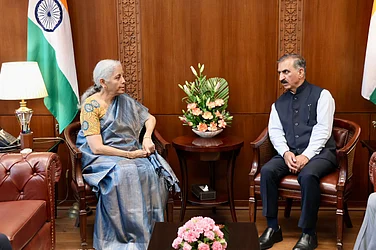A collision course for government and industry was charted with the introduction of two bills last week to replace the draconian FERA of 1973 vintage with the Foreign Exchange Management Act (FEMA) and to put in place a Money Laundering (Prevention) Act. Much of the heat and dust was raised by some provisions of the Money Laundering (Prevention) Bill. While industry associations have little to cavil about with the provisions of the FEMA, the Money Laundering Bill is criticised for vesting enforcement agencies with discretionary powers that can be used to harass a businessman.
The Money Laundering Bill includes various sections from the Indian Penal Code (IPC), Prevention of Corruption Act, Narcotic Drugs and Psychotropic Substances Act, Arms Act and the Suppression of Immoral Traffic (Prevention) Act. In short, all major offences which help in generation of black money have been made part of the bill. However, what gives real teeth to the bill is that any case under the proposed Act is non-bailable. And this is making the industry associations squirm.
Once an accused is put behind bars, he will have to wait a maximum of six months for the judgement from the appellate authority before the accused can go in appeal to the high court. All this is proposed to be handled by an agency to be created shortly. Says a revenue investigation agency spokesman: "With financial crimes—Vabal licence misuse, excise evasion, bogus exports—reaching unmanageable proportions in the last 10 years, inclusion of some provisions of the IPC was the best thing that could happen."
But are the provisions of the Money Laundering (Prevention) Bill as draconian as is being made out by the industry leaders? Among the provisions of the bill are prosecution of any person acquiring the proceeds of crime, the property of the accused to be attached during trial and confiscated upon conviction, a minimum of three years' rigorous imprisonment extendable to seven years and 10 years in respect of drug-related offences, and the appellate authority to decide cases in six months. Further, the offences are non-bailable and the right to appeal before the high court is only permitted after the appellate authority has given its verdict.
It's the last two provisions which have attracted the most flak from businessmen for fear that these might be used to harass and settle scores. Another provision being opposed is the one relating to "falsification of accounts". "Since the IPC is ambiguous on the definition of accounts, we would like it to be reviewed," said a FICCI executive. A simple clarification by the government could probably take care of the fears over "account books".
Says a revenue department official, rejecting the suggestion that the proposed law is stringent: "An international body, called the Financial Action Task Force (FATF), has been working with officials of several countries to develop laws to counter the menace of money laundering. Indian officials have participated in the meetings and the draft bill does have the provisions of the model money laundering bill.
One of the past recommendations of the FATF was to make it mandatory to put photographs for all bank accounts." As for a higher punishment for drug-related offences the industry cannot complain, since even at present such offences attract a minimum sentence of 10 years, a provision which has merely been carried forward under the Money Laundering Bill.
Points out a senior official in a revenue investigating agency: "The grip of the law is being loosened. So, should the deterrent not be stronger?" But that seems little consolation to industry associations. For monitoring of cases, the bill makes it mandatory to report transactions over Rs 25 lakh within a month, to the new agency which will implement the law. Effectively,






















